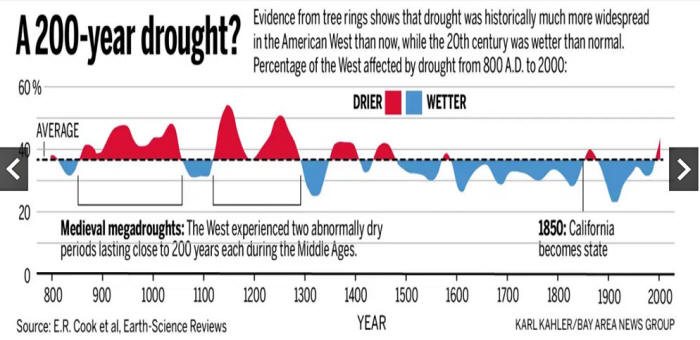|

by Paul Homewood
July 18,
2021
from
NotAlotOfPeopleKnowThat Website

There has been a longstanding concern about blatant bias at
the BBC, not least in matters of
climate change.
This certainly dates
back at least to January 2006, when they held a seminar of "top
scientific experts" to advise them on climate change.
The BBC fought tooth and
nail to conceal the identity of these 'experts', but it was
subsequently discovered that they were not experts at all,
but the usual collection of green lobbyists.
Ever since, the BBC's coverage of
global warming has been woefully
one sided and at times inaccurate,
This year they have been publishing a monthly feature, Then and
Now, purportedly showing how climate has been changing in a
'warming' world.
One article looked at
the recent drought in California, while another claimed that the
Victoria Falls had dried up.
Both implied that climate
change was to blame, with the usual weasel words that while
one weather event cannot be linked to climate change, "scientists"
say that such events are likely to get worse with global warming.
However both stories omitted crucial information, which would have
shown such claims to be nonsensical and
untruthful...

California, for instance, has had droughts in the 20th
Century every bit as bad as the current one.
Moreover the official
data clearly shows mega-droughts there were much worse for much of
the last thousand years or so.
In short, California
is a land of drought.
The modest amount of
warming there since the
Little Ice Age has altered
nothing.
The BBC claims about the Victoria Falls were even
more absurd...
For a start,
the Falls did not run
dry; every dry season lake levels drop.
As the Zambian side
is at a higher elevation, the Falls there dry up, while
continuing at the other end.

Source
This happens every year,
but the BBC deceitfully misled readers by showing a
split image comparing January 2019 with December 2019.
In January every year
water levels rise sharply, and Jan 2020 was no exception.
It is certainly true that there was a drought in the region in
2019, and water levels were lower than average.
But the Zambezi River
Authority say that there have been six occasions since 1914 when
water levels were lower, the worst being in 1995.
Just as with California,
the BBC have picked on a drought, but ignored all of the
data showing that they are both natural events, with no
evidence that droughts are getting more severe or common.
This sort of misreporting of the Victoria Falls is of
extreme concern to Zambia's tourist industry and local businesses,
who are naturally worried that tourists may stop visiting if they
think the Falls are no longer there.
Which brings us to the point of the story...
I complained to the BBC
that both stories were grossly misleading and omitted crucial
information.
Complaints to the BBC go through three stages.
The first response
appears to be written by the office junior, who tries to fob you
off with a few bland statements.
If you are unhappy, you can resubmit the complaint, which
usually gets the same response, though dressed up in sciency
sounding language.
Finally you can appeal to the Executive Complaints Unit.
As is usually the case, I
effectively received the same reply at all three stages, viz:
-
There was a
drought
-
"Scientists say"
climate change is making droughts worse
None of the replies
actually addressed my complaint, that the actual data shows droughts
are not unusual or getting worse at either location.
The real issue here of course is that the BBC Complaints Dept
is all in house, even the ECU.
In effect the BBC is
marking its own homework.
In theory it is
possible to appeal to
OFCOM.
In practice however
they have no obligation to investigate, and would only consider
doing so for substantive cases.
Clearly BBC bias will
never be addressed until they are subject to a fully independent
process, just as the press is.
In the meantime, if
Tim Davie is serious about
cleaning the stables, he should start by taking his axe to the
bloated, fourteen strong Environmental Dept, which is now clearly
out of control.
Instances of bias and misinformation, such as these two, are now
commonplace in their output, and they seem to believe that they
don't even have to pay lip service to editorial guidelines anymore.
|




